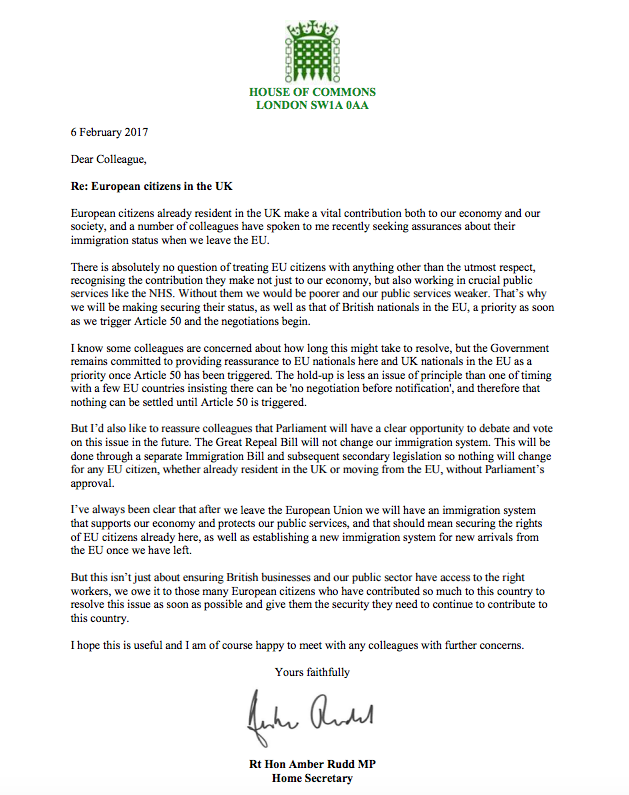- FAQ
- Login
- Register
- Call Workpermit.com for a paid service +44 (0)344-991-9222
ESC

Welcome to immigrationboards.com!
Moderators: Casa, John, ChetanOjha, archigabe, CR001, push, JAJ, ca.funke, Amber, zimba, vinny, Obie, EUsmileWEallsmile, batleykhan, meself2, geriatrix, Administrator
Well, the Lord Speaker and the Leader of the Labour Lords have both said that the Lords will pass the Brexit bill in about a month, though of course it is entirely possible that they may attempt to amend it. So, it is unlikely that the Lords will attempt to override the will of the Commons.Obie wrote:The Lord's may well reject it. It can go on for about a year, before the Lords can be bypassed.
True, but Parliament as a body is above the courts. I suggest that you reread the Supreme Court judgment in the Miller case, with a particular emphasis on paragraphs 40-46.Obie wrote:EU citizens have their future in their hands, and don't depend on politician. They will seek to take the British Governments to the courts if any attempt is made to trample on their rights. No government or Politician is bigger than the court. Even Donald Trump will attest to this.
An Act of Parliament would be untouchable and unquestionable in the courts. Even EU law depends on an Act of Parliament (the European Communities Act 1972) for its application within the UK.43. This is because Parliamentary sovereignty is a fundamental principle of the UK constitution, as was conclusively established in the statutes referred to in para 41 above. It was famously summarised by Professor Dicey as meaning that Parliament has “the right to make or unmake any law whatsoever; and further, no person or body is recognised by the law as having a right to override or set aside the legislation of Parliament” - op cit, p 38.
Paragraph 182 specifically repudiates the EU law doctrine in Van Gend en Loos (Case C-26/62) [1963], that EU law creates obligations irrespective of national legislation.67. ...
That is because of the principle of Parliamentary sovereignty which is, as explained above, fundamental to the United Kingdom’s constitutional arrangements, and EU law can only enjoy a status in domestic law which that principle allows. It will therefore have that status only for as long as the 1972 Act continues to apply, and that, of course, can only be a matter for Parliament.
Well, Parliament is made up of politicians and it is a political beast. Similarly, judges constitute courts. It is all very well to say that one is not necessarily the other in theory, but they do interlink deeply in fact.Obie wrote:Politicians are not Parliament, just likes judges are not the court. The court is a supreme body and judges are mere servants or Judicial officers. So you are clearly wrong to equate politicians and parliament.
I am just keeping them informed with dispassionate updates.Obie wrote:But Simon I believe EU nationals will do just fine. You need not worry about them.
A fine (in at least two senses of that word) distinction indeed. Worthy of a lawyer.Obie wrote:I respectfully disagree with you Simon on politician and parliament.
The politician are exercising the power of parliament to make law, and to vote for or against those laws. The Judges are judicial officer, that the power is bestowed upon to make a decision on the interpretation of the law.

The Great Repeal Bill will not change our immigration system. This will be done through a separate Immigration Bill and subsequent secondary legislation so nothing will change for any EU citizen, whether already resident in the UK or moving from the EU, without Parliament’s approval.
The way the amendment is phrased, it is possible that people on the Surinder Singh route and Zambrano caretakers may not be covered.Within three months of exercising the power under section 1(1), Ministers of the Crown must bring forward proposals to ensure that citizens of another European Union or European Economic Area country and their family members, who are legally resident in the United Kingdom on the day on which this Act is passed, continue to be treated in the same way with regards to their EU derived-rights and, in the case of residency, their potential to acquire such rights in the future.”
Unusually, the normal budget debates have been taken off the schedule for parliamentary business for this week and replaced with three days of time for any ping-pong between the two Houses on the Brexit bill. The Lords are unlikely to insist on their amendments, but the FT article (above) suggests that up to twenty Conservative MPs may vote for the Lords amendments, including the amendment to grant EU citizens the right to remain in the UK unconditionally.One UK government official involved in the process said he “hoped” that Article 50 could begin on Tuesday when Mrs May is due to address the House of Commons, but would certainly start by the end of the week.
The plan to escalate a query to the ECJ/CJEU as regards the reversibility of Brexit through the Irish courts has been dropped, primarily on lack of time and cost grounds.secret.simon wrote:But a case has been launched through the Irish courts in Dublin on this very point. The idea is to escalate it all the way to the ECJ, who can give a ruling binding on all EU member states and possibly on the Brexit process itself.